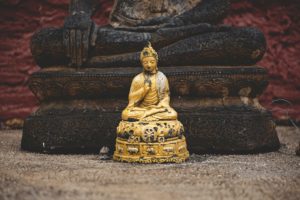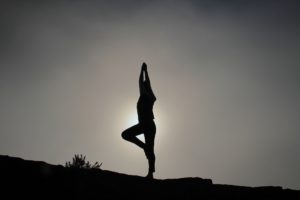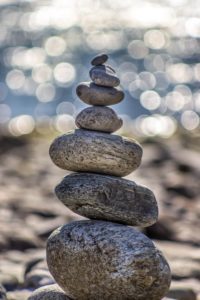by Jenny Rose | Jan 25, 2018 | Power
Arguing with what is.
Possibly the most fruitless endeavor in the world.
Yet many of us consistently argue with how we are, how others are, and how the world is.
Arguing with what is is like living in an unending war. Clinging to a story inconsistent with what is requires constant vigilance. Our lives begin to revolve around the fear that the truth we refuse to acknowledge will escape or be exposed.

Photo by Ian Espinosa on Unsplash
We cannot allow that to happen, so we put all our energy into convincing ourselves that what is isn’t. Then we start trying to persuade others to validate our particular reality because God speaks to us, or we’re especially victimized, marginalized, enlightened, rich or powerful. If we can’t persuade others, we try to create and enforce rules requiring them to fall into line, to agree, at least tacitly, with our point of view and belief system. We scorn critical thinking, science and evidence-based data. We discourage questioning, careful definitions and nuances. We create jargon, acronyms, blacklists and smear campaigns. We enlist the sympathy, empathy, kindness and compassion of well-meaning but naïve people. We set up zero sum games, use gaslighting, violence, abuse, projection, deflection, sweeping and inaccurate generalizations and distortions. We hurt ourselves, and we hurt others.
Arguing with what is is a full-time job.
My particular version of arguing with what is takes place mostly in my head. For example:
I don’t feel loved.
What? How can you say that? Remember that one kiss at the beginning, the most passionate kiss of your life? You know you want that again! Think of how funny he can be, how charming, how much fun! If you don’t feel loved it’s because you’re not trying hard enough. You’re ungrateful. You’re disloyal. You’re a bad partner. You don’t deserve him. You want too much. You’re needy and demanding. Of course he loves you, he’s just not comfortable saying it! You are happy and loved. Get a grip!
I don’t feel happy or loved.
I had this ding-dong conversation with myself for years. I desperately and repeatedly tried to convince myself I was both happy and loved, but I could never quite silence that deep internal voice that went right on saying, “I don’t feel loved.” It wouldn’t shut up. After years of this nonsense, I finally got so exhausted I stopped arguing with my true feelings and ended the relationship. Then, one day I came across narcsite dot com and immediately recognized the narcissist-empath dynamic.
You know what? I was right. I didn’t feel loved because I wasn’t, in fact, loved.

Photo by Travis Bozeman on Unsplash
Arguing with what is means fear and self-doubt are my constant companions.
So what’s the other side of the coin? What’s the fix for arguing with what is?
This magical phrase: However this needs to be, it’s okay with me.
Say it aloud: However this needs to be, it’s okay with me. Is it a lie? It usually is a lie for me when I first apply it to any given situation. I want things to be predictable, controlled and adhere to my expectations and standards. I expect that of myself, of others and of the world.
I haven’t had great luck with that expectation. The rebellious world is chaotic, unpredictable and unexpected. I’m not in charge of anyone but myself, and my feelings (along with the rest of me) are disobedient and refuse to be controlled.
My need for control and predictability are rooted in fear and lack of trust in myself. If, at any moment in any day, however things need to be is not okay with me, I know I’m dealing with fear or lack of self-trust, and those are both places where I have all the power. That instant refocus from avoiding, denying or refusing an inconvenient or unexpected truth or reality over which I have no power to the very center of my power clears away anxiety, confusion and fear. What happens in me, in a day, or in the world is not really the problem. The problem is in the way I manage my power and my choices. Addressing my own power and choices allows me to say, with perfect truth, that however this needs to be, it’s okay with me.
Being okay with the ways things are doesn’t mean endless love, light and turning the other cheek. It doesn’t mean I accept boundary violations, bullying, coercion, violence or any other kind of power-over games. It doesn’t mean I tip-toe through life pleasing others, following rules and keeping silent. It doesn’t mean toadying to the political correctness police. It doesn’t mean I feel no frustration or disappointment, or that the status quo should remain unchallenged and unchanged. It means clarity about where my power is.
Nobody wants a flat tire, herpes, an unwanted pregnancy, a cancer diagnosis, mental illness, the flu or to lose a loved one. We don’t want superstorms that wipe out our homes, the uncertainties and anxiety of climate change or food and water shortages. Nobody voted for lead in their drinking water, or to experience genocide. Nobody wants to be silenced, attacked, abused, marginalized, shot or scapegoated.
Yet all these things are. They’re real, along with many magical, wonderful things, and I can’t change the way things are.

Photo by Ludde Lorentz on Unsplash
I can only change the way I am. I can decide when and how to speak. I can decide how I interact with others. I can listen, learn, research, ask questions, think critically and decide where I stand on important issues. I can speak up for those without voices. I can pay attention to my own integrity and operate within it. I can disengage, refuse to pick up poisoned bait, move away from where the blow is going to land (sometimes) and learn self-defense.
I can say no.
I can learn to trust my own courage, willingness to love, intelligence, feelings and ability to adjust and adapt to whatever happens. I can choose confidence and curiosity as companions.
I can make sure that however I need to be, it’s okay with me.
I can surrender to others in all their strengths and imperfections. Each one of us is however we need to be, sick or well, destroyer or hero, weak or strong, power-over or power-with. People in the world are okay with me, and I choose who I engage and connect with, who I support or hinder, who I share power with, who I collaborate and cooperate with and who I allow in my life.
However this minute, this hour, this day needs to be, it’s okay with me. If I catch the flu, it’s okay with me (Ugh). If I can’t get out of the icy driveway to go swimming, it’s okay with me (Rats!). If I reread the rough draft of this post and decide it needs to be rewritten before tomorrow when I post, it’s okay with me (what a pain in the neck!)
I can accept what is, deal with it, and go on.
Or I can argue with what is.
It’s a chocolate-or-vanilla choice, and we make it a hundred times a day.
Whatever you choose, it’s okay with me.
And So

Photo by freestocks.org on Unsplash
And so, after all, it was no use,
That desperate determination to please.
In the end a hidden, untamed thing
Always looked out of my eyes,
Beseeching for freedom,
And none of us could beat it down.
Now all the rigid outlines of my life
Have fallen around my feet in graceful folds.
I’ve counted silver threads and lines
And granted freedom.
If there’s no lover for what I am
I can kiss my own shoulders.
All content on this site ©2018
Jennifer Rose
except where otherwise noted
by Jenny Rose | Jan 18, 2018 | Connection & Community, Emotional Intelligence
For several weeks the depth of snow has limited my ability to walk on our 26 acres. Last week we had a couple of inches of rain that arrived with the scent of the sea and tropical warmth, followed by a hard, fast freeze. The rain melted a great deal of snow and we had flooding. The sudden freeze created a hard crust on the remaining few inches of snow, and as we returned to subzero winter temperatures I decided to see if I could get down to the river.

Photo by Vincent Foret on Unsplash
The crust supported my weight — sometimes! Other times I broke through and floundered up to my knees, the icy rind bruising and scraping my lower legs in spite of long underwear and heavy canvas pants. I saw tracks of deer and moose, rodents and birds in the snow. The river, ice encased, had thawed slightly and flooded during the rain, so the cracked ice was piled in slabs. In some fissures I could see open water. In other places thin new ice had formed and old, yellow ice lay flat but spiderwebbed with cracks.
As I stood next to the river catching my breath and marveling at the power of winter, I could hear the voice of the ice. It’s an odd sound, because it comes from beneath one’s feet rather than the sky or the world around. The ice pops and groans, sings and mutters and snaps. It’s a wild, unearthly voice, a chorus of cold water, cold air and cold crystals, the medley of flowing, living water and rigid winter armor. I wondered what it sounded like to the creatures hibernating in the river bed and the beavers in their dens.
The trees here have voices as well. When the wind blows they creak and groan as they sway, and their branches rub together, making a classic haunted house rusty hinges sound. In the deep winter when it’s very cold, sap freezes, expanding, and the trees explode with a sound like a gun going off. Sometimes they split right through the trunk.
So many voices in this world. Every place has its own special choir, every season its own song. The sound of a beetle chewing bark, the Barred owls calling to each other in the snow-bound January night, the agonized shriek of a vixen calling for a mate on a February midnight of crystal and moon, and the barely discernible high-pitched talk of the bats as they leave their roost at dusk are all familiar voices to me.
I’m a seeker of voice, a listener, partly because I’m a writer and partly because I know what it is to be silenced. Our world contains so much pain and suffering, such unimaginable horror and injustice that my compassion is frequently overwhelmed. I cannot staunch the wounds and wipe the tears of the world.
But I can listen. I can bear witness. I can stand and wonder and marvel at the wild ice, the mating owls, the hunting bats and also the handful of people in my life. For a few minutes, I can encircle another with my presence and attention, allowing their voice to speak freely, truly and fully. I can choose to have no agenda about the voices of others, no expectations or judgements.
I can also give that to myself. It’s only in the last three or four years that I’ve reclaimed my own voice. That, more than anything, is why I began writing this blog. Once a week I sit in front of a blank page and write in my true voice. Blogging, for me, is not about validation or statistics. It’s not about trying to please anyone, creating click bait or competing. It’s about contributing my voice because I am also here, not more important but as important as anyone else.
Using our voice does not require a listener.
Listening to the ice and the world around me has allowed me to realize, for the first time, how deeply I’m committed to appreciating and supporting authentic voice. My appreciation is a thing apart from agreement or disagreement with what I hear. Speaking our truth is not a matter for criticism. It’s an offering of self, and listening without judgement is an acceptance of that offering. I feel no need to annihilate those I disagree with.

Photo by Quino Al on Unsplash
The dark side of voice is the voice that deliberately drowns everyone else out, the voice that silences, controls and distorts our world and our sense of self. The voice that deliberately destroys is an evil thing, a thing afraid and threatened by the power of others. Dark voices throw words like a handful of gravel in our faces.
An essential part of self-care is learning to recognize, minimize and/or eliminate our exposure to voices we experience as destructive or silencing. This is boundary work. Note the difference between appropriate boundaries and dropping an atomic warhead. Healthy boundaries do not disrespect, invalidate or silence others.
I wonder what the world would be like if all criticism, jeering and contempt were replaced with “I hear you. I’m listening. I believe in the truth of your experience. You are not alone.” What would we be like if we gave that gift to ourselves?

Photo by Quino Al on Unsplash
And what of lost voices? I don’t mean unheard or unremarked, but those voices who spoke, faintly, for a moment, and then were silenced so brutally and completely no one but the silencer heard their last cry. Such a person lives, breathes, walks, eats and sleeps, but he or she is a shell mouthing superficial words. Attempts to draw close, to understand, to share authentically and elicit a true voice in return are all in vain. The phone is off the hook. Silence and deflection are the only response. No one is at home. Love and listening count for nothing and behind the mask is only emptiness. Connection is denied.
How many voices can we truly hear? The world is filled with a cacophony of sound made by billions of people. Even here in the heart of Maine the voice of the river is punctuated by traffic noise. We all seem intent on increasing our exposure to voices via social media, 100 TV channels, streaming, downloading and YouTube. Does all this clamor make us better at listening and honoring voices? Can we listen to our child, our mate, the TV, and read Facebook all at the same time?
Some people say they can, and perhaps it’s true. What I know is I can’t. I don’t want to. I don’t feel listened to when I’m competing with other voices. I can’t hear myself when my day is filled with racket and din. I can’t extend the gift of presence to 100 friends on Facebook. I can’t discern between an authentic voice and a dark voice in the middle of uproar.
Voice is precious. It’s sacred. No created character lives in our imagination without voice. Silencing voice is a horrific violation. I have promised myself I’ll never again abdicate my own voice.
Honoring voice, yours, mine, theirs, and the world’s.
All content on this site ©2018
Jennifer Rose
except where otherwise noted
by Jenny Rose | Jan 11, 2018 | Connection & Community, Emotional Intelligence
In life coaching, I was introduced to the idea that human beings have three primary needs: Connection, contribution and authenticity. I have yet to discover a need that doesn’t fall into one of these categories, so at this point it’s still a frame that works for me.

Photo by Peter Hershey on Unsplash
For me, any discussion of connection must include spiritual connection, and to talk about that clearly I need to define terms.
Spirit: The nonphysical part of a person that is the seat of emotions and character; the soul.
Religion: The belief in and worship of a superhuman controlling power, especially a personal God or gods.
Faith: Strong belief in God or in the doctrines of a religion, based on spiritual apprehension rather than proof.
Ideology: The ideas and manner of thinking characteristic of a group, social class, or individual.
Sacred: Connected with God (or the gods) or dedicated to a religious purpose and so deserving veneration.
(All definitions from Bing search.)
Spirituality: Spirituality may refer to almost any kind of meaningful activity, especially a “search for the sacred.” It may also refer to personal growth, blissful experience, or an encounter with one’s own “inner dimension.” (Wikipedia)
The archeological record tells us we have sought to understand ourselves as part of a greater whole from the infancy of mankind. Long before written records were made, there was cave art, pottery and carving thought to represent sacred beings, including, in many cases, animals. When we began to write, myth, story and legend wove a rich tapestry of religion and other spiritual frameworks all over the world.
Our powerful need for spiritual connection has historically been a significant motivator geopolitically, economically and creatively. Our search for understanding who we are and what our place in life is, individually, culturally, politically and socially, firmly anchored in our conception of spirit.
How do we create a spiritual connection? How do we choose from such a bewildering array of beliefs and ideologies? How do we cope with tribal shaming if we don’t accept the spiritual beliefs of our family or tribe? How do we think about the “nonphysical part” of ourselves, and what, if anything, does that part of us need?
It’s taken me more than 50 years to even begin to answer these questions. The two biggest obstacles I had to overcome were disconnection from my own feelings, and denying having any needs. Disconnection and denial are both disempowering, and healthy spiritual practice, at its heart, is a practice of self-empowerment.
Some people approach formal, organized religion as a way to share power. Others are quick to use it to assure power over others, and at that point it no longer fits my definition of a healthy spiritual practice. Discovering and nurturing the shape of our own spirit is an act of dignity, privacy and self-respect. It has nothing to do with what anyone else thinks or believes. We decide where we stand on the continuum between science and faith, and we define what is sacred in our lives. We have the power, and we have the responsibility. No mystic, guru, psychic, yogi, mentor, sponsor or other spiritual or religious leader or authority knows what we need better than we do. We owe nobody an explanation, justification or apology for our spiritual practice, as long as that practice doesn’t seek to harm or control others.
That’s not to say the guidance, teachings and wisdom of scholars, practitioners, philosophers, masters and thinkers are without value or interest. Yoga, martial arts, meditation, mandalas, drumming, dance, sacred traditional music and countless other rituals and traditions may be part of a spiritual practice, but none of these are essential. The real strength of spiritual practice doesn’t lie in appearance, embellishments, publicity or visibility and has nothing to do with economic or social condition.
A spiritual practice is an activity in which we are wholly present with ourselves in a nonjudgmental fashion and after which we feel empowered, anchored, refreshed and renewed. A healthy spiritual practice is a haven, a refuge, a place of solace and joy. It connects us to ourselves, to others, and to something larger than we are. It doesn’t matter if we name that something God, Allah, Spirit, Divine, Goddess or even Gaia, it all boils down to the basic human need for some kind of spiritual connection.
A few weeks ago I wrote about living a seamless life. My spiritual practices are frequently invisibly embedded throughout my every day life, requiring nothing more than my presence and intention.
Here’s an example: After a long day the kitchen is full of dirty dishes. I slather my hands with the most luxurious lotion/cream in the house and don rubber gloves. I turn off lights, tech and the TV. I light a couple of candles. I might play some music, or just soak up silence. I look out the window over the sink. I breathe. I relax. I’m present. I’m consciously grateful for a kitchen, dishes, a sink, running hot water, the ability to stand and use my hands, and food that creates dirty dishes. I take time to feel what I feel, check in with myself, daydream and drift.
I approach exercise as a spiritual practice. I’m not worried about my weight or health, but I do notice I feel better, sleep better and function better if I stay active, so my daily goal is to show up at some point with myself to move. Sometimes I dance. Once a week I swim, then soak in a therapy pool, then take a long hot shower. I walk, both by myself and with my partner. This winter I’m going to begin snowshoeing. I do Tai Chi. With the exception of walking with my partner, all of these activities are opportunities to have time with myself, quiet, undistracted time in which to be in my body, remember what a beautiful world I live in, practice gratitude, allow feelings, pray, chant, sing, work creatively, stretch and breathe. When I’m finished I feel relaxed, empowered, centered and grounded.

Photo by Miranda Wipperfurth on Unsplash
A spiritual practice may be as simple as a special tree, rock, crystal, cushion and/or candle. It might be a secret altar or shrine, a string of beads or a stick of incense. It can take place anytime, anywhere, solo or in a group. It can be a five-minute pause or a long weekend of ritual at a hot spring, but it always makes us bigger. Anything that diminishes, restricts, confines, limits, shames, invalidates or disempowers us is not a healthy spiritual practice, no matter what anyone says. It’s merely an ideology of control.
Many of us naturally find our way into spiritual practice without realizing what we’re doing, impelled by this often unconscious but powerful human need. Recognizing the need for spiritual connection, giving it language, honoring and allowing it, allows us to take back our power to define and protect sacred space in our lives, free from distraction, interruption, multitasking, pressure, hurry and the constant noisy static of media and entertainment. If our spiritual life is tainted by criticism and judgement, our own or others’, it won’t sustain us and our spirit will sicken and starve. We’ll begin to look outside ourselves for spiritual nourishment and become vulnerable to addiction, perfectionism, pleasing others and people who steal power.
The care and feeding of the spirit is the least talked about aspect of the need for connection, but it may be the most important. In the absence of spiritual connection, all our other connections suffer. True spiritual power transcends physical strength, youth and beauty, and it cannot be coerced or stolen. Our greatest strength may lie in our ability to create spiritual connection for ourselves and support others in theirs.

Photo by Deniz Altindas on Unsplash
All content on this site ©2018
Jennifer Rose
except where otherwise noted
by Jenny Rose | Jan 4, 2018 | A Flourishing Woman, Minimalism
It’s the first week of the new year, and many of us are pausing to look back over our shoulders at where we’ve been the last twelve months and then turning to survey the path before us, at least as much of the path as we can see. The Internet is awash with lists of how to make new year resolutions as well as lists of why we shouldn’t make new year resolutions. Advertising for buying our way to a new persona is frenzied.
As usual, I’m out of step. I’ve read a couple of great pieces this week, one about the limits of willpower and a list of 13 things to give up for success. I’ve read and re-read them, thought about them, and discussed the first article extensively with my partner. Normally when material like this catches my interest it develops into a blog post, but this week nothing is happening.

Photo by Amy Humphries on Unsplash
All I can think about is simplicity.
Lists are great. I used to be a champion list maker. They guided my whole life during a lot of complicated years.
Now? Not so much.
I have really simplified.
But the thing about simplifying is how complicated it is.
For example, more than a year ago I stopped shaving. But that’s not where it started. It started with me deciding I was no longer going to please people. But that’s not exactly where it started, either. Part of it started when I decided to allow myself to be everything I am and nothing I’m not.
If I hadn’t given up on pleasing others and limiting myself, I never would have stopped shaving. It wouldn’t have crossed my mind to do so. Interrupting this lifelong habit never made it onto a list, though it would have been easy to cross off. One decision and it was over.
Making a list of behaviors to discard is wildly misleading, because it doesn’t address what underlies our inappropriate and ineffective behaviors, and that’s where all the ongoing and time-consuming work is.
Pleasing others and making myself small are two lifelong, deeply entrenched habits, and I work every day to make different choices. It’s not easy. I’m not perfect. (Another deeply entrenched habit – perfectionism!) Any distress or inattention results in automatic reversion to my old habits. I don’t expect to ever be able to cross ‘stop pleasing others’ and ‘stop making yourself small’ off a list.
On the other hand, working to change and challenge these two big things allows a whole cascade of smaller habits to loosen and fall away, the kinds of habits that are reasonable to put in a list. Pleasing others and making myself small create an immensely complicated set of actions.
Anyway, one day it occurred to me to ask myself why I shaved.
Answer: Because everyone does. It’s a social rule that women shave their body hair. Hairy legs are unattractive.
The everything-I-am and nothing-I’m-not me: Oh, yeah?
The not-pleasing-other-people me: I don’t think hairy legs are unattractive. All my lovers have had hairy legs. I didn’t mind. In fact, I like body hair. It adds texture and sensation, especially in erogenous zones. I refuse to accept that male hairy legs and armpits are acceptable and female hairy legs and armpits are ugly. That’s ridiculous.
So I stopped shaving.
Ahhh! Simplicity.
No more razors or shaving cream to buy and throw away. No more rashes, nicks or razor burn. Less hot water, less time in the shower. Bonus: In wringing humidity and hot weather, the hair on my legs and under my arms helps me cool more effectively. Another bonus: No more microcuts in my armpits. I worry less about health concerns regarding deodorant. A third bonus: Hairs provide sensory information. If a tick is crawling on me, it stirs the hairs on my body and alerts me to its presence.
I still wear shorts and skirts. I swim every week. My partner appears to be able to deal with a woman in a natural woman’s body without fainting with horror. In fact, I don’t think he even really noticed.
Shaving is just one of many examples of things that can be crossed off lists, but before we can get to those, we have to deal with the big stuff, and that’s hard, ongoing work. The big stuff drives the little stuff. Want to get more exercise? Work on keeping your word to yourself. Want to lose weight? Excavate your relationship with food and redefine it (which means change your life and purge your kitchen).
Simplicity is frequently the end result of complex effort.
On the other hand, some of us have a genius for making simple steps unbelievably complex.
Take exercise, for example. Do you want to exercise more? Really? Then set down the device you’re reading this on, put on clothes appropriate for whatever is outside and (here’s the hard part) walk. You don’t need a dog, a buddy, your mate, special clothes, neon shoes, a Fitbit, a step counter, a timer, a gym membership or a piece of expensive equipment. You don’t need earbuds or entertainment.

Photo by Jon Flobrant on Unsplash
Just. Walk.
Now you’re getting exercise. Do it every day and you’re getting more exercise.
It’s simple. Nike got it right. Just do it.
If it feels more complex than this, it’s not the exercise that’s the problem, it’s some belief or pattern (often deeply buried and unconscious) that’s sabotaging our efforts. And that’s complex!
It’s been very cold here in Maine, as it has in many other parts of the nation. We had heavy snow on Christmas Day. After my daily stint of three or four hours of writing, I wanted a walk, so I layered up and went out into the storm.
Unbroken fresh snow underfoot. One set of tire tracks going up the hill. The chill kiss of wet flakes against the little bit of exposed skin on my face. Wind, and the sound of the trees groaning and creaking and the snow hitting my hood. The sound of my own breath, which condensed on the scarf wrapped around my face, crusting it with ice. My steady footsteps squeaking up the hill. Everything grey and white and shadow.

Photo by Aaron Burden on Unsplash
Christmas Day, and nothing but swirling snow and breathing, walking, the warmth and vitality of my own life. So simple. So peaceful. So starkly beautiful, and nothing to do but inhabit my body and the day.
In these days, fully in the grasp of winter, life is reduced to the wood stove, hot meals, my daily exercise and my writing practice. At 4:30 p.m. it’s dark. Storm and gale, wind chill and subzero temperatures limit our ability to drive. We delve into our piles of books. The cat snuggles with us on the couch. If the power goes out, we light candles and I’m not displeased. At night, the house pops and cracks, groaning in the cold and the wind. Sitting in my comfortable chair with my feet up and a blanket around my shoulders, I doze off as I’m reading The Element Encyclopedia of Magical Creatures. This kind of extreme cold is very simplifying. Eat. Stay warm.
Simplifying my life has made me happier, healthier and more productive. It’s also been frustrating, slow, unpredictable, unexpected, terrifying and painful. It has not looked like an orderly list on a fresh sheet of paper written with my favorite pen. It would be nice if it were that easy, wouldn’t it? Lose weight. Check. Get more exercise. Check. Spend more time with family and friends. Check. Get more sleep. Check.
Those are all worthy goals, and perfectly attainable, but not by writing a list or making new year resolutions. Changing behavior is a great deal more complicated than that, and creating a life of simplicity is an enormous undertaking.
Boy, is it worth it, though!
Happy New Year to each of you.

Photo by Das Sasha on Unsplash
All content on this site ©2018
Jennifer Rose
except where otherwise noted














